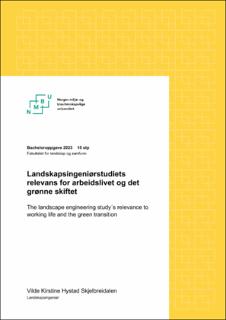| dc.contributor.advisor | Berg, Kristin Marie | |
| dc.contributor.author | Skjelbreidalen, Vilde Kirstine Hystad | |
| dc.date.accessioned | 2023-08-22T08:55:43Z | |
| dc.date.available | 2023-08-22T08:55:43Z | |
| dc.date.issued | 2023 | |
| dc.identifier.uri | https://hdl.handle.net/11250/3085168 | |
| dc.description.abstract | Tittelen på oppgaven er «Landskapsingeniørstudiets relevans for arbeidslivet og det grønne skiftet». Hensikten med oppgaven er å se på hvordan landskapsingeniørstudiets innhold og oppbygging oppfattes av tidligere studenter, kartlegge hvor behovene for landskapsingeniørstudiet ligger, og se på hvilke måter studiet kan utvikle seg videre. Gjennom en empirisk studie med datagrunnlag hentet fra kandidatundersøkelse og intervju, forsøker jeg å besvare problemstillingen «I hvilken grad forbereder landskapsingeniørstudiet studentene for arbeidslivet og det grønne skiftet?
I oppgaven går jeg gjennom en «firetrinnstrategi», der jeg har sett på resultater fra Programrådets kandidatundersøkelse fra 2022, foretatt intervjuer med landskapsingeniører og lærere som underviser på studiet på bakgrunn av resultatene, og gjort en selektiv analyse av NMBU´s nye strategi. Konklusjonen er at den store bredden av fag vi går gjennom, er et godt grunnlag for arbeidslivet, men at det samtidig er behov for endringer.
Det er behov for endringer innad i enkeltfag, og vektlegging av fag, for å gjøre studiet mest mulig relevant til mulige arbeidsoppgaver i arbeidslivet. Eksempler på endringer innad i enkeltfag er bedre utnyttelse av de «grønne» fagene ved å fokusere på planters egenskaper og anvendelse, kontra pugging av navn. Eksempler på endringer i vektlegging av fag er å trekke inn flere av de praktiskrettede tekniske fagene, samt fag som omhandler prosjekt i større grad, da det er nyttige forberedelser til arbeidslivet.
The title of the thesis is “The landscape engineering study´s relevance to working life and the green transition”. The purpose of the thesis is to look at how the content and structure in the landscaping engineering study are perceived by former students, to map where the needs for the landscaping engineering study lie, and to see different ways the study can develop further. Through an empirical study with data taken from a candidate survey and interview, I attempt to answer the thesis statement “To what extent does the landscape engineering program prepare students for the working life and the green transition”.
By going through a “four-step strategy”, where I have looked at results from the Program Council´s candidate survey from 2022, conducted interviews with landscape engineers and professors based on the results from the survey, and made a selective analysis of this year´s NMBU strategy, it emerges that the large base of subjects is a good basis for working life, but that there is a need for changes.
There is a need for changes within individual subjects, and an emphasis on subjects, to meet the relevance as best as possible for the different tasks for work. Examples of changes within individual subjects are better utilization of the “green” subjects by focusing on plants characteristics, as opposed to the memorization of names. Examples of changes in emphasis on subjects are the inclusion of more of the practical technical subjects, as well as subjects that deal with projects to a greater extent, as they are useful preparations for working life. | en_US |
| dc.description.abstract | The title of the thesis is “The landscape engineering study´s relevance to working life and the green transition”. The purpose of the thesis is to look at how the content and structure in the landscaping engineering study are perceived by former students, to map where the needs for the landscaping engineering study lie, and to see different ways the study can develop further. Through an empirical study with data taken from a candidate survey and interview, I attempt to answer the thesis statement “To what extent does the landscape engineering program prepare students for the working life and the green transition”.
By going through a “four-step strategy”, where I have looked at results from the Program Council´s candidate survey from 2022, conducted interviews with landscape engineers and professors based on the results from the survey, and made a selective analysis of this year´s NMBU strategy, it emerges that the large base of subjects is a good basis for working life, but that there is a need for changes.
There is a need for changes within individual subjects, and an emphasis on subjects, to meet the relevance as best as possible for the different tasks for work. Examples of changes within individual subjects are better utilization of the “green” subjects by focusing on plants characteristics, as opposed to the memorization of names. Examples of changes in emphasis on subjects are the inclusion of more of the practical technical subjects, as well as subjects that deal with projects to a greater extent, as they are useful preparations for working life. | en_US |
| dc.language.iso | nob | en_US |
| dc.publisher | Norwegian University of Life Sciences, Ås | en_US |
| dc.rights | Attribution-NonCommercial-NoDerivatives 4.0 Internasjonal | * |
| dc.rights.uri | http://creativecommons.org/licenses/by-nc-nd/4.0/deed.no | * |
| dc.title | Landskapsingeniørstudiets relevans for arbeidslivet og det grønne skiftet | en_US |
| dc.title.alternative | The landscape engineering study´s relevance to working life and the green transition | en_US |
| dc.type | Bachelor thesis | en_US |
| dc.description.localcode | B-LI | en_US |

